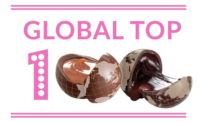South America is filled with ancient ruins, rich culture, and religious influence. Coastlines, mountains, rainforests, and even an expanding glacier reveal its diverse natural beauty.
The archaeological and cultural sites of Easter Island and Machu Picchu, combined with the natural beauty of Galapagos Islands and Angel Falls, are just a taste of what it has to offer.
The region’s unique geography has affected its economy, according to Mauldin Economics. Where the Andes and Amazon have divided the continent, ports have sprung all around its coastal borders. There is no regional leader, and there are countries with political and humanitarian issues.
South America is also an important contributor to the confectionery industry, which is why Candy Industry has compiled this list of the top South American confectioneries. After all, there are theories pointing to the birthplace of chocolate in the Amazon rainforest, not Mexico and Central America as previously thought.
In 2019, Brazil was the world’s seventh-largest cocoa producer, according to the World Cocoa Foundation’s CocoaAction Brasil. More than 700,000 hectares of cocoa were planted in that year, while 70,000 farmers, mostly small to medium size, produced 197,000 tons.
Brasil Sweet and Snacks, the international brand of the Brazilian Association of the Chocolate, Peanut and Candy Industry (ABICAB), says its country’s confectionery industry was $26.4 billion in 2018 with 42,000 workers at the time.
“Brazil is the largest cocoa producers in LATAM (Latin America) region, but its entire production serves the Brazilian market,” says Carlos Follana, marketing and communications coordinator for International Cocoa Organization (ICCO).
The latest statistics from ICCO reveal South and Central American countries exported 65,534 tonnes of chocolate and chocolate products in the 2019-20 period, compared to 93,269 tonnes during 2010-11. Although his organization could not provide much feedback on effects of COVID-19, Follana says during the first wave of the pandemic there was a delay exporting cocoa beans from Peru and Ecuador.
That may be significant, since according to the 2019 UN Comtrade Database, Ecuador and Peru are in the Top 15 cocoa exporters worldwide. The official international trade statistics repository says the value of cocoa exports decreased by 0.5 percent to $20.1 billion worldwide, with Ecuador exporting $745 million and Peru exporting just over $268 million. The top cocoa exporters for that year were Cote d’Ivoire at $4.8 billion, Netherlands at $3.2 billion and Ghana at $2.7 billion.
Factors that attract companies to Brazil, according to the Brasil Sweets & Snacks website, include a stable democracy and sustainable growth. The country gets almost seven million visitors a year and was exporting $677 million of confectionery to over 160 countries.
Half of the companies in our new list are from Brazil. In addition, Grupo CRM is one of the country’s largest franchises, with over 800 Kopenhagen or Chocolates Brasil Cacau locations and doing about $327 million a year. Advent International Corp., an international private equity firm, announced last October a strategic partnership with Grupo CRM.
Grupo CRM seems to be navigating the COVID-19 waters and even looks to growing. “Our expectation is to grow 20 percent, compared to 2019, this year,” says Ayla Meireles, company spokesperson. “We were very fast in our digital transformation, and the methodology we developed was very strategic and made us (get) through this difficult moment.”
According to ABICAB data, collected and consolidated by KPMG, “During the first quarter of 2021, the production of chocolates in Brazil was 189,000 tons, an increase of 23% over the same period in 2020. This increase is mainly due to the resumption of production after a difficult period.”
On ABICAB’s website, in 2020, the industry produced 757,000 tons of chocolates, exported 30,000 tons, and imported 16,000 tons.
The Brazilian fresh peanuts sector registered a trade balance of $70.8 million between January and April 2021, an increase of more than 10 percent compared to the same period in 2020, according to data from ComexStat. From January to December 2020, the result of the Trade Balance amounted to $314.4 million, which represents a 38 percent growth compared to 2019 ($227.7 million). In all, 259,000 tons of fresh peanuts were exported, an increase of 31 percent compared to the previous year.
In the candies and gums market, the trade balance registered in volume 77,100 tons in 2020, compared to 78,900 tons in 2019, according to JeffreyGroup, public relations firm for ABICAB. Despite the drop in production, sales reached $98.9 million last year, compared to $97.7 million in 2019. “Production in 2020, which was 214,000 tons, ended up suffering a retraction against the scenario of 2019, as it is mostly a product for consumption outside the home.”
Through its PR firm, ABICAB says, “However, analyzing the three sectors, it is possible to notice that companies continue to invest and consolidate in other formats of sales channels, mainly through the expansion of online commerce, which has been gaining more and more strength among Brazilians. In addition to digital reinforcement, we observed that industries quickly adapted to the pandemic scenario also at physical points of sale, adapting them in the best possible way so that consumers can shop safely and responsibly. The industry also managed to recover through innovation, developing a broad portfolio, with different formats, with portions for individual or shared consumption, meeting the needs of consumers.”
Others also got by. Compania Nacional de Chocolates, a subsidiary of Grupo Nutresa S.A., of Medellin, Colombia, also has been able to steer through the pandemic. “Our diversified portfolio of markets and categories has allowed our business to navigate the pandemic and thrive during this difficult time,” says company spokesperson Alejandra Sarasty. “We have adapted to the changing market circumstances and have embraced and incorporated positive changes like new channels, updated go to market strategies, segmented portfolios and updated value propositions. We strengthened our value proposition of our leading brands, invested in finding ways to be closer to our consumers, reaching them directly through D2C channels.”
Personal relationships are particularly important to the South American people. They feel it is important in doing business and it influences how companies interact with clients, according to global business experts, Healy Consultants. Appearance, body language and a slower approach to life are noteworthy, as well as knowledge of the native language, Portuguese in Brazil, and Spanish for the rest of the continent.
Giving back to the community is part of this philosophy.
“As a food company in a core industry, during the pandemic, we continued working to guarantee food access worldwide,” says Micaela Goldstein, Arcor spokesperson. “We went through this stage with great flexibility throughout the company and adapting to the context. During this period of time, we developed a strong bond with our entire environment: community, consumers, and collaborators.”
The Argentinian confectioner’s community bonding included donating 962,606 kilograms of food to various countries, candy to community centers and medical institutions, and 15,000 liters of alcohol to the Ministry of Defense of the Argentine Republic, municipalities, and hospitals.
Argentina exported over $164 million of confectionery from its country in 2018, according to a Statista July 2021 report. Yet this is a decline from its high in 2012 of $295 million exported.
There have been other positive outcomes this year. Embaré, of Belo Horizonte, Brazil, has seen an increase in international buyers this year, noting it sold to 33 countries in 2020 and has clients in 42 countries as of June, according to Felipe Antunes, export manager.
“Since most of our revenue comes from dairy, which is an essential item line, we have managed to maintain our production throughout 2021 with very little impact of the pandemic (even though volumes dropped),” he says.
Previously, Candy Industry has reported total sales for Embaré, and now sales are divided by categories, decreasing reported sales to about $17 million for confectionery-only sales and another $1.25 million in chocolate dairy. Embaré does about $363 million in total business.
In an effort to create closer bonds with clients, Colombina S.A. launched a digital platform promoting growth of small merchants around Colombia, says Isabella Henao Vallejo, director of communications for the Cali, Colombia manufacturer. The main objective of this app, she says, is for shopkeepers to manage their business, through plans and activities tailored to each particular type of store.
“COVID-19 had a wide-ranging effect on social and economic dynamics around the world, generating great uncertainty, but even more desire to overcome adversity,” Vallejo says. “This gave us the opportunity to demonstrate our resilience once more, and for companies, to strengthen sustainability strategies as progress drivers — to stride ahead hand-in-hand with stakeholders.”
“Colombina faced one of the biggest challenges a company could dare during the pandemic,” she continues, noting the company maintained 100 percent of the food supply chain. “We kept our business running by guaranteeing compliance with all biosafety protocols to safeguard the health of our employees. It was not easy, but thanks to everyone’s commitment, we kept our direct staff on and continued paying their salaries and bonuses on time, and in full.
“Looking ahead, we find out that COVID-19 has engrained deep lessons in all of us, reaffirming the importance of teamwork, of being supportive and responsible with one’s fellow human beings, and above all, the communication rooted in empathy.”
Dori Alimentos, of Sao Paulo, Brazil, like most other companies, has initiated actions to protect employees from the virus, according to company spokesperson Carlos Assis. He says they meet weekly to discuss current situations and provide care for affected employees and their families.
“An Epidemiological Surveillance Center was also installed with the objective of reducing the internal transmission chain by performing tests and examinations,” he says.
As for increasing business, Dori Alimentos acquired a fourth mogul line for production of filled and three-layer starch jellies and gelatin gummies.
To push forward, Ivan Blumenschein, co-owner of Nugali Chocolates of Santa Catarina, Brazil, says the company has made stronger use of digital and social media to communicate brand messages to consumers.
“Due to lockdowns and mobility restrictions, our ecommerce sales have increased threefold,” he says.
Nugali has increased its product line with chocolates with natural inclusions and flavorings, such as fruits and herbs, “showing that the combination of healthy and indulgency is possible,” Blumenschein says.
Even though Hershey of Brazil and Nestle’s Chocolates Garoto are two big players, as are the other global candy companies, only confectioners headquartered in South America made the list.
_900x550.jpg?1670344885)




.jpg?height=200&t=1670344891&width=200)
